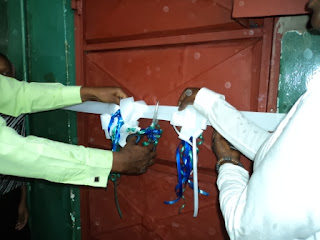Today I received truly awesome news. One of our
sponsored students was accepted into the Certificate in Early Childhood
Training Program in Montessori Methodology at Ushirika wa Neema in Moshi,
Tanzania. Her story is one of – or maybe
the most moving story of all the teens and young adults that we sponsor.
[I will not use her name because we try to maintain the
privacy of all our students]
In the spring of 2009, almost 5 years ago, this young woman
got off a bus in Moshi, having run away from circumstances in her Maasai
village that involved early marriage and female circumcision. Local police then
took her and her friend to Moshi’s Juvenile Detention Center. International volunteers, who were working at
the Center, brought her to the attention of Grace Lyimo, who became our Country
Director the following year.
Through Grace’s networking and efforts, the two Maasai young
women were enrolled in a private secondary school that was just starting
outside of Arusha. International volunteers
had agreed to pay school fees while EdPowerment took on all their personal
needs including lodging during breaks.
N struggled mightily because her deficient education (many
Maasai still refuse to education girls) had not even taught her good Kiswahili. Now she had to learn the full battery of high
school subjects including English. At
the end of her first year, the school’s administrators and EdPowerment decided
that it would be best for N’s prospects if she repeated the year. But the struggle didn’t end here.
At the end of N’s Form 3, her secondary school dismissed her
and several other students. The school
decided that they were not performing to a satisfactory level and that their
Form 4 National Exam results would reflect poorly on the school’s growing reputation. N and her peers were tossed to the
street.
Mama Grace intervened once again and another school agreed
to let the girls finish their secondary studies. This past November, N graduated. Her English skills and her confidence have grown exponentially. In September, N told me that what she wanted most in
the world was to be able to teach and counsel young children.
In November Mama Grace took N to several post-secondary schools
that offered appropriate advanced certificate programs. N’s dream was to join Ushirika wa Neema, a
well regarded school for teaching in the Montessori method. First, though, she had to take an exam – and
she told Mama Grace that it was HARD.
But this week, she got the letter (ALL U.S. HIGH SCHOOL
GRADUATES CAN RELATE TO THIS!) and she got in!
We are so excited.
And we are so grateful that EdPowerment, N’s original sponsors, and all
our supporters – not to mention N’s resiliency, bravery and fortitude –
made this miracle happen.
BEST GIFT EVER.










